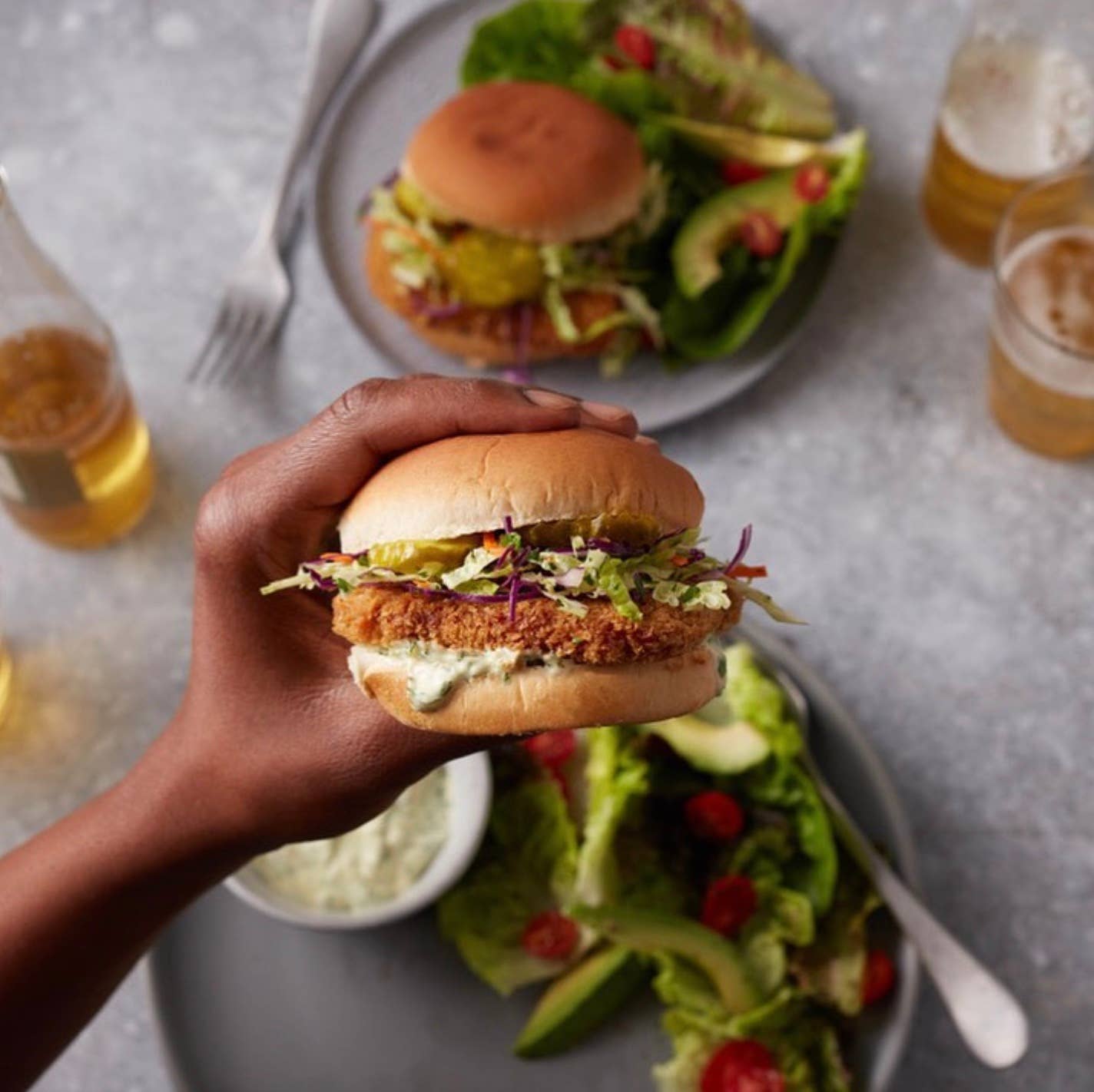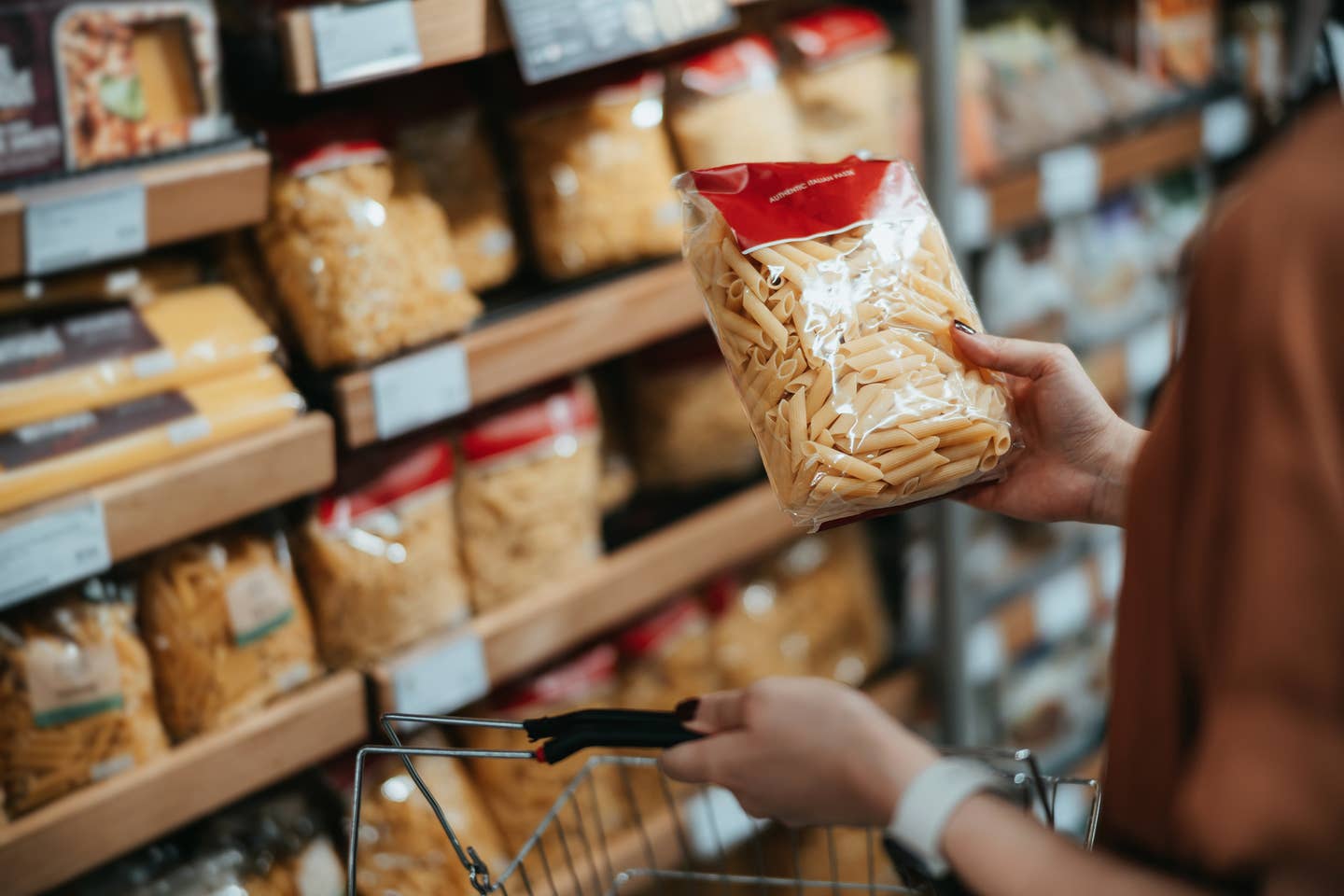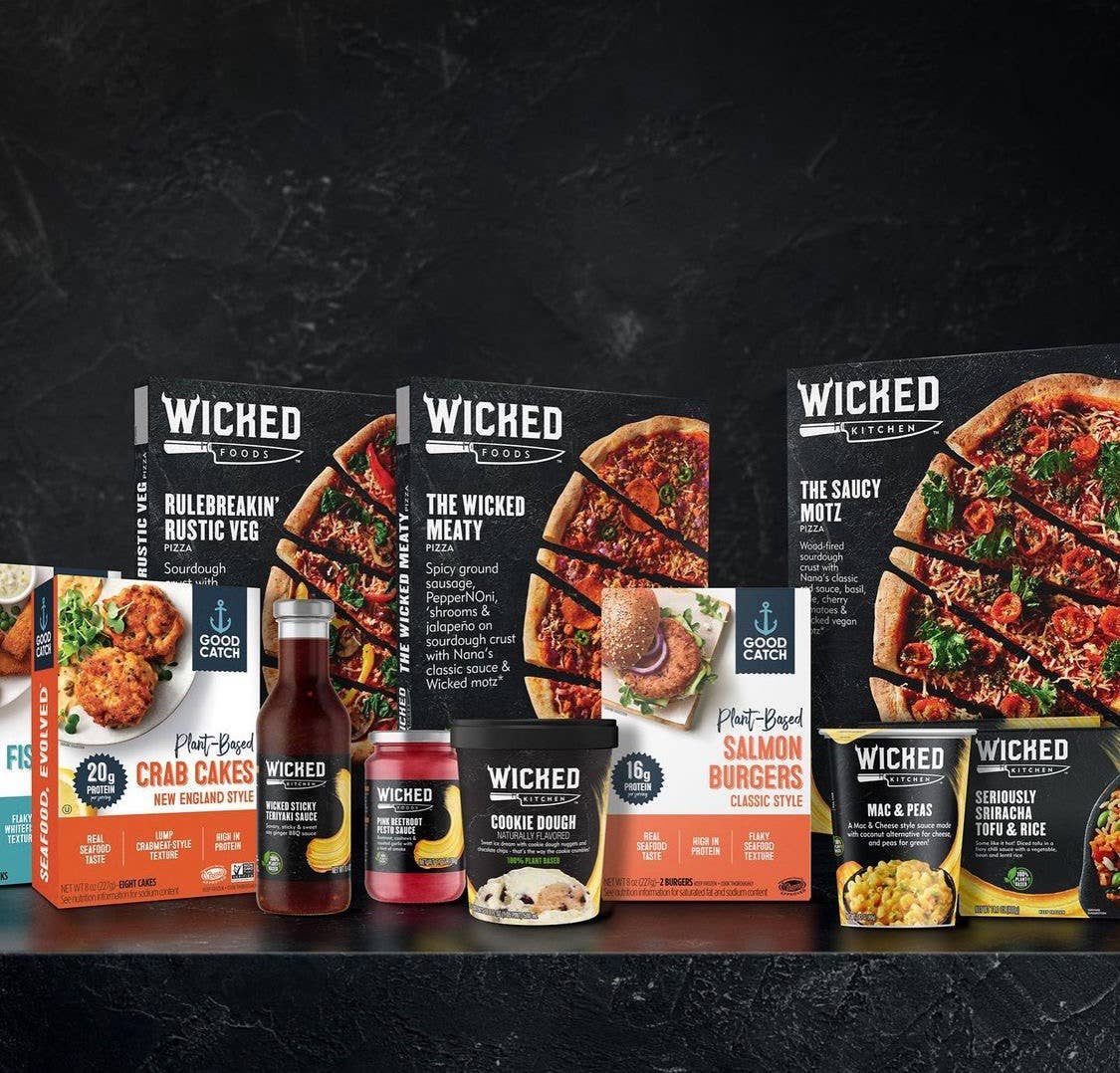
The Top 10 Food Trends for 2022: Vegan Seafood, Mycoprotein and More
We ended 2020 wanting Covid to just be over and betting on plant-based chicken. Now, with so much plant-based chicken everywhere, we finish up 2021 still wanting Covid to be over – and a whole new set of exciting plant-based food options on the horizon. Here are our Top 10 Food Trend Predictions for 2022.
Note to the plant-based consumer hoping to eat healthier in 2022: Not all plant-based or vegan options coming your way are equally healthy. As always, you can be healthiest by making your own cashew cheese at home or creating a delicious burger from mushrooms and lentils and as always, load up on vegetables and fruit. iI's always healthier to create your own food than to buy packaged items from the store. But sometimes, convenience calls, and we need to buy our plant-based products. When that happens, here is what to look for next.
But even so-called transition foods like the first Beyond Burger or Impossible nugget you ever ate, that helped you move away from meat and dairy, are either better for you or are better for the planet, or both – and as more consumers than ever are concerned with climate change, plant-based options that have less impact on our greenhouse gas emissions are luring more people to make the switch. So while these gateway foods may be far from perfect, 2022 will see a plethora of options, making it easier than ever for more people to embrace a plant-based way of life.
Top Food Trend #1. Mycoprotein Makes Whole Cuts Possible
Made from a fungus related to the mushroom family, mycoprotein is a sustainable protein source that uses less water and resources to grow than soy, wheat, peas, or oats. When manipulated into food products, mycoprotein can replicate meat in texture and taste and satiate people's cravings for the foods they love.
Now companies like The Better Meat Co, Nature’s Fynd, AtLast and Meati are all creating whole cuts of "meat" from mycelium (the strands in fungi that seek water and nutrients), as well as potatoes and more. They do this by using bio-mass fermentation. Mycoprotein is typically 45 percent protein and contains no cholesterol or fat, so is considered a healthy source. When perfected, this technology will be an industry game-changer for the center of the plate protein.
Top Food Frend #2. Veggies of the Sea
According to a recent presentation by SPINS at Plant Base World Expo, retail dollars are spreading out from plant-based to burgers (so 2020) to chicken (very 2021) and now fish (which will be big in 2022), and plant-based seafood is riding a wave that is only expected to gain in speed and momentum.
Aqua Cultured Foods, Good Catch Tuna and Crab and Fish Cakes, The Plant-Based Seafood Company (made with Konjac!), New Wave Foods, Shiok Meats (made from cellular agriculture), Save to Sea (made from carrots!) are all serving up plant-based fish that would delight any toddler and most adults as well.
And it is going mainstream: Good Catch (named PETA's company of the year in 2021) has launched affordable options that make vegan fish more accessible than ever, offering both New England Style Crab Cakes and Plant-Based Fish Sticks and Plant-Based Fish Fillets at BJ’s Wholesale Club nationwide.
Top Food Trend #3. Unique Plant-Based Ingredients
As producers move away from mono-cropped soy, wheat, and corn, ingredients like chickpea, mung bean, fava beans, mushrooms, sorghum, and barley will all play a bigger brand story role. Companies like Ingredion, ABinBev, and InnovoPro are shifting the landscape with unique ingredients, and these ingredients may take front-of-pack positioning for CPG products.
Top Food Trend #4. Eat (and Package) for the Planet
Innova Market Research states that planetary health has just surpassed personal health as the #1 reason why people are switching to more plant-based diets. Because of the new-found urgency to lower our impact on climate change, companies are responding by prioritizing environmentally-sound packaging, Leaders include beauty companies selling refillable packages, such as Hear Me Raw, and in the food sector, more are creating packaging that you can compost. One such company is Evanesce, producer of Evanesce® Molded Starch technology, for sustainable solutions such as disposable food packaging that can decompose in 90 days or less.
Top Food Trend #5. Whole Food Plant-Based Meals In Your Freezer
Forks Over Knives, the iconic brand known for its eponymous magazine and documentary that encouraged millions to eat whole food plant-based for the sake of disease prevention and reversal, went national at Sprouts at the end of 2021 with its first frozen food line. Like its competitors, Cool Beans, Amy’s, Purple Carrot, and others, Forks Over Knives ensures you can eat a healthy whole foods diet without all the fuss.
We predict the frozen aisle will continue to expand with plant-based items, as more people focus on healthy eating and reading labels but still need a quick and convenient option. Forks' frozen bowls are expected to expand to more retailers in 2022 so ask for them at a retailer near you!
Top Food Trend # 6. Direct to Consumer & Vegan Markets
The direct-to-consumer marketing by vegan and plant-based companies is taking off, but so is the phenomenon of markets that cater to plant-based consumers. With more people eating for the planet and their health, these niche brands and markets are suddenly no longer so small. First, there was Vejii, then PlantX and now that company is growing its brick and mortar footprint. All are selling exclusively plant-based and vegan-friendly products to meet consumer demand for convenient, frictionless, vast choices of vegan foods, all delivered to your door. Vejii recently announced that it had purchased Vegan Essentials and also VedgeCo as it continues its growth across the US and beyond.
Top Food Trend #7. Animal-Free Dairy That is Exactly Like Real
At the Superbowl in 2021, the President of Oatly, Toni Petersson, paid millions for an ad in which he sang, “Wow, No Cow.” This phrase will start to actually make sense as fermented proteins allow companies to start producing dairy equivalent products, but without the animal. This is done by fermenting the dairy in the lab.
By the end of the year, we will see more opportunities to taste everything from ice cream to all sorts of cheeses made from this type of animal protein made without the animal. Already Brave Robot is creating dairy-equivalent proteins, which are sold to the public by Perfect Day. And more companies like Change Foods, Better Dairy, ReMilk, and Those Vegan Cowboys are hard at work on creating proteins that are dairy-identical but produced without the involvement of cows.
Top Trend #8. Cultivated Oil Made Without Animal Fat
Cultivated animal fats (again created in the lab, without cow) will begin to replace distinctive coconut oil for tastier burgers, sausages and patties that fry up better and offer a more attractive outcome for the environment, animals, and your health. More on this to come, but know this: Coconut and palm oils are high in saturated fat that has been linked to heart disease. These can be engineered to be healthier for the planet, and for humans.
Top Trend #9. Small Companies Go Big
Plant-based items will evolve from small natural stores and grow into larger national chains. Grounded Foods and Hooray Foods bacon make noise at Whole Foods and clean label Hungry Planet and Barvecue brands take root at Sprouts. While not all brands will scale up and make the move from Mom and Pop stores to big-box chains, those that do will take on more retail real estate as the grocery stores make room for plant-based.
Top Trend #10. Politicians Invest in Alternative Protein, NYC Elects Vegan Mayor
You don’t hear this too often. California takes a nod from Connecticut. In early 2021, Rosa de Laura requested funding for alternative protein research. Now California’s Ro Khanna has requested $50 million from the USDA to research alternative proteins that will help to combat global food insecurity. Meanwhile, Tufts University got a $10 million grant to establish the nation’s first Institute for Cellular Agriculture. So it looks like 2022 will be the year that government gets on board with the trend of eating plant-based and alternative proteins.
New York City just elected its first vegan mayor, Eric Adams, who has made it no secret that he wants to help improve the health of the city, both physically and economically. Adam, who went vegan in 2016, changed his diet following a type 2 diabetes diagnosis. From that point forward, the mayor-elect has dedicated his political and public life to enhancing the health of New York City, especially within communities of color. Recently, Adams published Healthy at Last which follows his plant-based transition alongside 50 recipes and discussions about how communities of color face a disproportionate amount of diet-related chronic illnesses.
Adams has appointed like-minded experts to the city's Food Policy task force to help him bring healthier choices to schools, city offices, and other places that New Yorkers get their food. New York's Food Policy website was created to share information about how the Mayor’s Office of Food Policy works to increase food security, promote access to and consumption of healthy foods, and support economic opportunity and environmental sustainability in the food system. So 2022 may be the year New York becomes the city that leads the way in helping kids and adults alike eat healthier.
Bonus Trend: Investing in Plant-based Innovation Got Personal
If 2021 was all about big investment by large corporate and VCs raising big money from big names, then 2022 is shaping up to be all about the individual investor partaking in the secular trend of plant-based eating and backing their favorite companies in the public stock market. As companies like Oatly and Beyond struggle with their stock prices (each down from their IPO prices and their all-time highs) and plant-based stocks have seen rollercoaster rides as institutional investors get flighty, consumers are expected to step in and pick up the slack, just as they have driven up stock prices for their favorite tech companies.
For more on plant-based business trends, follow Elysabeth Alfano, host of The Plantbased Business Hour, Founder of Plant Powered Consulting, and CEO of VegTech™ Invest.
More From The Beet






